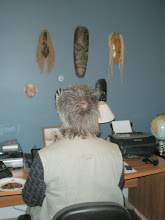A few months back I had a couple of conversations with a man whose son lives in The Old City. The son - amazingly enough - was attending a meeting I regularly visited and speaking with a couple of men that I know well. In my conversations with the dad I was able to vouch for these excellent, excellent guys, easing his mind a bit.
The son was a hard case, having been hospitalized a few times for esophageal bleeding and other complications stemming from his drinking. He had entered a treatment center but quickly left, objecting to one of their requirements: not working for a while to concentrate solely on recovery His excuse - admirable in intention - was that he owed child support and wanted to keep earning money to pay down his debt.
After another hospitalization his organs failed and he died. Forty years old. How important is that money now? How important is anything that gets in the way of our recovery?
Being a writer I sent the dad the following note:
Writing has been my creative outlet over the years and I've especially enjoyed - or at least learned from - writing about my own recovery. I think it's pretty hard to bullshit yourself when you're writing to yourself, you know? What's the point?
So waxing philosophical . . . .
I've been struck by how often I read that pain is unavoidable and that pain is part of life and that pain is just about the only way I grow. Pain is inevitable - suffering is optional. I like the line: "Pain is the touchstone of all spiritual growth." There's a lot of stuff in our Program literature about pain being part of the process.
I read a lot of spiritual stuff and my latest effort is another trip back through the New Testament. I found this in Romans recently: "We can rejoice, too, when we run into problems and trials for we know that they are good for us - they help us learn to be patient. And patience develops strength of character and helps us trust God more each time . . . " I'm sure I would have found something similar if I had been reading in the text of another religion - you mentioned a priest giving the homily at your son's funeral so this passage might be apropos.
I'd also suggest finding a grief group to join. In the last year I lost my mother and my father and Ken H, my sponsor of 25 years, a man who was more important in my life than my own dad. I started going to a grief group loosely run by one of the pastors and a retired psychologist at this hippy-dippy non-denominational church that is the site of my 7AM morning meeting. I've learned so much about loss. That there is no right way or wrong way to grieve; that it takes whatever time it takes to get through the worst of it - there's no set time frame to adhere to; that grief can come from all kinds of places - there are people there who have lost parents and spouses and children, who are getting divorced or have recently retired, who have lost pets; that grief can express itself in depression or anxiety or guilt or anger, and sometimes in all of these and in no particular order. With some of the folks I roll my eyes and think "you should be over this" and with some of them I don't know how they get out of bed in the morning and all stages in between.
And there's nothing worse than having someone not in the middle of a problem suggesting ways to get through a problem. If there's something that resonates here - great. If not, please take it in the spirit in which it was given.
Hey, I had two crowns done Monday and I have a 1PM root canal appt tomorrow. That make you feel any better?

No comments:
Post a Comment